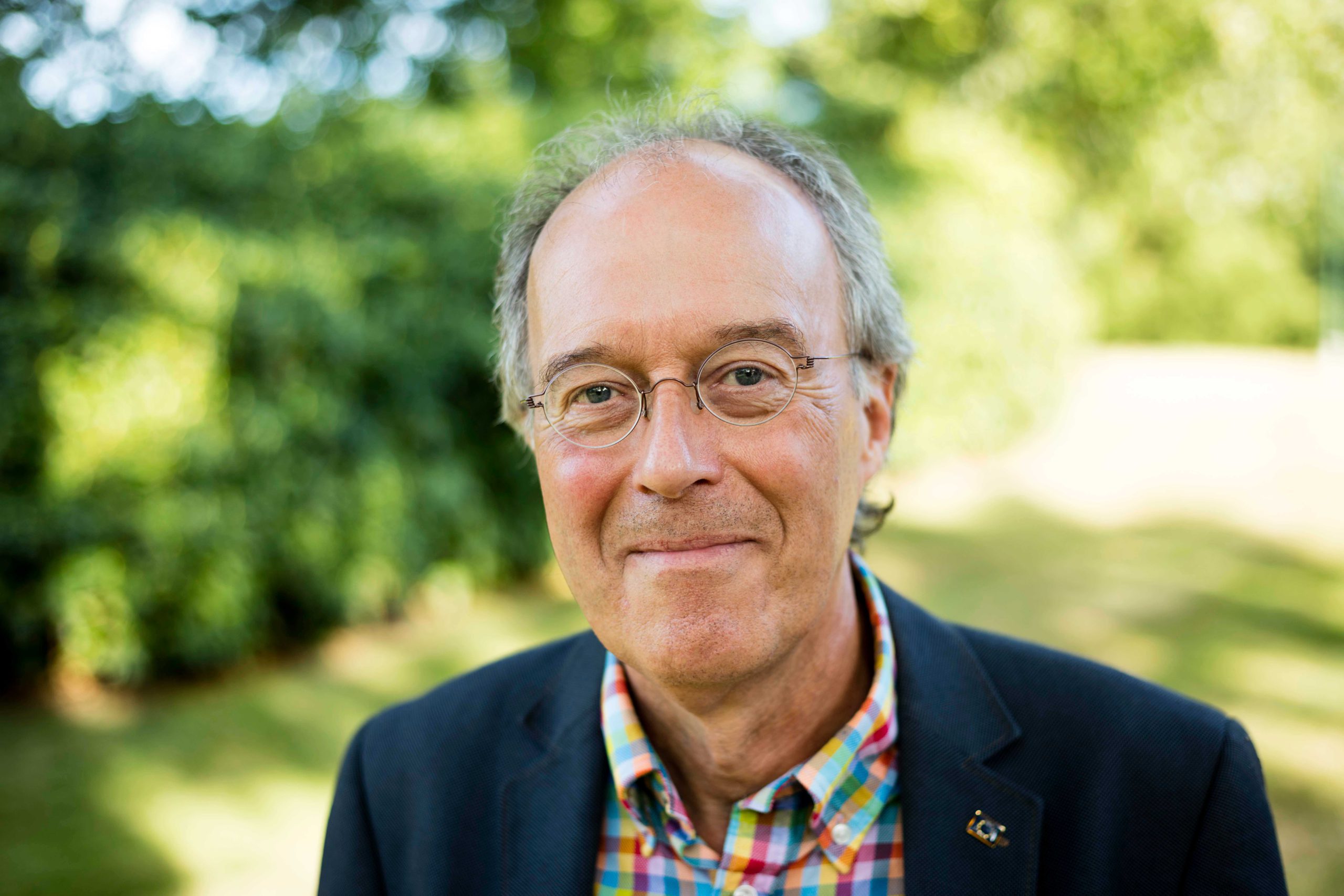
UvA Lecturer of the Year 2020 René Smits talks about Connection: a special interdisciplinary lecture series
Emeritus Professor René Smits (FdR) was elected UvA Lecturer of the Year 2020. In doing so, he won a Carte Blanche for setting up an interdisciplinary lecture series for the Institute for Interdisciplinary Studies (IIS). The lecture series entitled Connection was offered there as an honours module in the second semester of the 2021-2022 academic year. René Smits talks about the process of developing and the result of this special lecture series, which was both academic and personal in nature.
Sharing the honour with other faculty winners
“I was told to my great surprise at a zoom session in October 2020 that I had been voted UvA Lecturer of the Year 2020. Before the ceremony, I was waiting with the other candidates in a breakout room. A special experience, as fun conversations about teaching immediately ensued, in which we exchanged plenty of experiences. Later, when I heard that my election had allowed me to develop an interdisciplinary lecture series, I was very keen to share the honour with the other faculty winners. They had also been chosen because of their teaching style that appeals to students. I decided to ask them to come and lecture with me in the interdisciplinary honours module, which I was allowed to develop. Besides the lectures I gave myself, six guest lecturers came to teach from their own discipline, within the theme Connection, which I had chosen. A lecturer from almost every faculty came to speak. That way, I could not only offer students an interdisciplinary lecture series. But also introduce them to different styles of teaching.”
Inspired by Vivek Murthy
“The idea for this Connection theme had been alive with me for some time: connecting between different views of life is a heart theme. Moreover, I believe that without connection, the process of conveying and learning does not happen. The book Together (The Power of Connection) by Vivek Murthy, which I read during the period I was elected, fitted in wonderfully well with this. Vivek Murthy is a physician and public health expert from the United States. He served during Obama’s presidency (and is again now serving under President Biden) as chief public health adviser. The book is about the importance of human connection, the hidden impact of loneliness on our health, and the social power of community. Social connection as the key to better health and a world with less loneliness. Murthy presents research that teaches that loneliness underlies many problems and diseases such as addictions, depression and anxiety disorders. In the book, he also describes remedies for loneliness and tells a personal story.”
Building a less lonely world together, from an academic perspective
“Loneliness is not only a health risk but also affects our society. It can create and increase feelings of division and polarisation. Society has become increasingly divided over the past two decades, exacerbated in the last two years by the Covid period. Murthy’s book is about how we can build a less lonely and more communal world. One of the most urgent challenges of our time. I thought, it is important to address the topic of Connection from an academic perspective. I thought it would be a nice challenge to explore building blocks of connection in this interdisciplinary lecture series together with fellow lecturers and the students. And then from different academic angles and perspectives. What is social connection and how do you connect? With that, it always gets personal too. And hopefully this will contribute to the students in their lives and thus in the lives of others. Also in their future workplaces.”
Contribution Vivek Murthy to conclude lecture series
“I wrote to Vivek Murthy to also come and give a guest lecture, but unfortunately my efforts led to nothing. I then boldly ‘pursued’ him on Twitter a few more times, with tweets tagging him. And finally, to my great surprise and delight, I did manage to get his attention. He himself was very keen to address the students and give them the opportunity to ask some questions. So after the last lecture, he spoke through Zoom for half an hour very nicely and penetratingly about the importance of love in business and in government action. He actually had only twenty minutes, which ended up being over half an hour. His also personal contribution was an incredibly special conclusion to an unusual lecture series. A lecture series in which teachers and students started thinking more consciously about connection as the key to problems in this world.”
Long preparation in between all the business
“I had a very long preparation time for this lecture series. Only in spring 2022, a year and a half after winning the prize, was the series held. It was completely new for me to develop an interdisciplinary lecture series. A lot of thinking and organisational work preceded it. One of the guest lecturers joked: win a prize, you get put to work. I was doing this alongside other work. Besides lecturing in the Law and Finance programme, I also work as a consultant, among other things. I also sit on a review committee of decisions taken by the European Central Bank as a regulator. It was still the time of online teaching and meeting. As a result, I worked a lot on the lecture series in meetings via Zoom.”
“In preparation, I was well guided by Iwan Oostrom, Ellen Fokker and Mary Herboldt-Soudant of the IIS. They advised me on formulating learning objectives, testing, the course description in the study guide and setting up Canvas. Student assistant, Diederik van den Bogaerde, provided support during the lectures. As a student in the Master Law and Finance, I had guided him on his master thesis two years ago. His support on technical matters, coordination between all involved and tracking student progress was indispensable.”
Guest lectures by faculty teachers of the year
“I am very grateful that the other faculty winners were willing to collaborate and think about this topic. They contributed a great variety of approaches to the topic of connection, which really appealed to students. A few examples: Andrea Weihrauch (EB) spoke about our relationship to robots. Neurologist Vincent Odekerken (FdG/UAMC) talked about connection in the brain. Bart Wallet (FGw) spoke about diasporic connections, from the perspective of the Jewish diaspora. This made students start contributing to their diasporic connection from Iranian, Tibetan and Chinese perspectives. Together with Bart Wallet, we visited the Holocaust Names Monument, as a stark reminder of extreme disconnection (with persecuted minorities: Jews, Roma, Sinti) in society. Elio Baldi (FGw), UvA lecturer of the year 2019, gave a lecture on connection between academic disciplines. Sharon Klinkenberg (FMG) gave a lecture on connection as a psychometric construct. Professor of astronomy Alex de Koter (FNWI) had students think about how we as humans relate to the universe. How do we connect to life elsewhere if there is any? And what consequences might this have for humans and society? Does it lead to more or less connection?”
“Furthermore, I had invited student Mika Hendriks, who works at the listening line, to give a short presentation on listening. Good listening brings connection. I myself gave lectures on European integration and connection, or the lack of it, social connection and connection with non-human animals.”
Diverse audience, diverse assignments
“The student audience was also diverse. About 25 students participated. They were from different faculties, as well as from different corners of the world. I was keen to give free assignments in this series as well. The final assignment produced very different and unusual presentations and projects. Paintings were made, poems were written. One student had made bracelets that represented the lectures, another student played guitar. This student had started a process in which he finally dared to play for an audience again. Inspired by Bart Wallet’s lecture, in which he talked about how people connect in different ways through the Talmud, a student had made a poster with Talmudic commentaries applied to his own situation.
“The most fun assignment I had come up with was to connect with a stranger every day for seven days. So make contact with someone you don’t know and report what that was like. Opening up to someone who plays no role in your life, someone you meet in passing. And then connect with that in some way, aiming to combat alienation and loneliness. This was an eye-opener for many students. For some, it awakened compassion. Someone else again found it terrible to do, due to an introverted nature, but then did it anyway. The easiest thing to do was to share something superficial with a stranger, like complimenting them on a nice pair of glasses or clothes. In some cases, this led to a nice conversation and introspection on why people so often pass each other by. Conversations regularly came about through dogs being walked.”
A beautiful experiment and a privilege
“It was inspiring and intense to work on this lecture series. I found it a privilege to design a module myself. And to brainstorm with others how to fill the 12 lectures. I enjoyed combining different learning styles and assignments. It was a lot of preparatory work and sometimes quite tough. Also because I had to seek coherence, give lectures myself, but also coordinate. I had to prepare much more than in my regular lectures and often delve into completely new material. Of course, I also had to check all the papers.
“To bring unity to the lecture series, Diederik and I wrote a ‘relay baton’ each week for the lecturers in the form of a kind of logbook on Canvas in which we summarised the lecture given. Students could also consult this. It gave them an overview of the lecture series. Whether the attempt to connect everything was completely successful, I don’t know. Establishing connection from so many disciplines and with students from different geographical and subject backgrounds was a tall order. I also got different reactions from students. Some had experienced profound life changes as a result of the lecture series. Others felt the experiment failed because some topics had not been addressed. I would also have liked to involve young researchers and junior lectures in this module, but unfortunately that didn’t fit anymore. But it was a nice experiment.”
Tips for others getting Carte Blanche
“Connection is close to my heart but is not a subject I normally teach. When getting a Carte Blanche to develop your lecture series, address social themes. And give non-traditional assignments, which often bring great things and insights, academically and personally.”
About René Smits
René Smits is Emeritus Professor of Economic and Monetary Union Law and is involved in the Master Law and Finance. He works as a consultant. And is a member of the review committee for decisions taken by the European Central Bank on bank supervision. He is editor-in-chief of a forthcoming book on sustainable finance.

About Vivek Murthy





